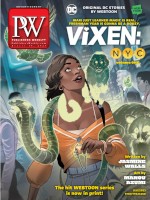In the stories and essays of Between Dystopias: The Road to Afropantheology (CAEZIK SF & Fantasy, Oct.), Ekpeki and Omenga explore the intersections of the fantastic and the spiritual.
What drew you to speculative fiction?
Ekpeki: I was exposed to speculative fiction at a young age through oral storytelling traditions maintained by my grandmother. She would tell us tales that were deeply steeped in lore and culture, smattered with the spiritual. Also, my brothers brought secondhand fantasy and science fiction novels when coming home from boarding school. So between oral storytelling traditions and secondhand novels—the only books we could afford at the time—I formed a strong love for the speculative.
What needs do you believe are met in coining the term Afro-pantheology?
Omenga: I grew up in an Igbo village in Nigeria. We children would gather in one compound and someone would tell a story featuring fairy characters or mythical figures. These stories are often a way of documenting the founding of communities, ancestral lineage, wars, the relationship between human and deities, living and dead, etc. Meanwhile, in school, I was exposed to mainstream fiction. As I grew older, I began to discern a common trend in these stories: they, too, are carriers of culture. Arthurian legends, for instance, reflect the gallantry of medieval England; Dickens reflects the class struggles of Victorian England, etc. But which literature reflects the African cultural experiences? The answer gave me pause. I have read Chinua Achebe, Buchi Emecheta, Ben Okri, etc. But as much as these stories document African experiences, they’re mostly experiences of Africans in contact with their colonizers. It was at this point that Toni Morrison’s admonition struck me: “If there is a book that you want to read, but it has not been written yet, then you must write it.” I knew the African experiences I wanted to see reflected in the stories I read. In coining Afropantheology, we aim to present a pedestal for African writers to boldly present African culture and mysticism from the African perspective. Without the validation of its source culture, art loses its essential significance and becomes mere entertainment.
You coauthor two stories in the collection. How did you approach collaboration?
Ekpeki: When we met, I was more exposed to speculative fiction, which I introduced to Omenga. He had a stronger grasp on the technical aspects of writing. So he’d edit my works from then on, while I’d work with him in developing speculative story ideas. We eventually wrote a novel together, a decade ago, which no, you can’t see. In those early times, our styles were still going through the melding process and this showed in the work. Still, it had a strong core, and I realized then, even in that failure, that there was something special—beautiful—that resulted from our collaboration, something that I believe we were more able to show in these newer works.



 Volume 270
Issue 33
08/14/2023
Volume 270
Issue 33
08/14/2023





